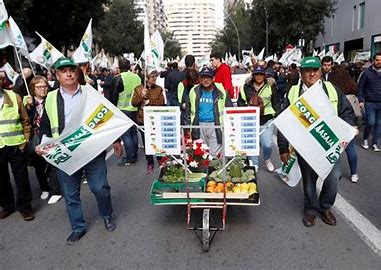
Spanish farmers’ associations said on Tuesday they were planning to take to the streets in February in protest against strict European regulations and lack of government support as unrest continues to spread across Europe.
The largest farmers’ groups – Asaja, COAG and UPA – share the same grievances as their peers in other European countries, saying environmental regulations imposed by Brussels are undermining the profitability of crops and increasing food prices.
Drought in southern Spain has also hit farmers, with production of several crops such as rice and olives dropping over the past two years.
“Mobilisations will take place as soon as possible,” Pedro Barato, president of Asaja, a Spanish association representing around 200,000 farmers and cattle breeders, said in a radio interview.
The protests are set to take place in the coming weeks, the organisations said in a joint statement. Asaja members are due to meet on February 1 to make preparations.
In neighbouring Portugal, the National Confederation of Agriculture, which represents small and medium-sized farms, said it too would organise protests, slow marches and other events. The dates are yet to be decided.
Meanwhile, as protests in France have intensified, some 20,000 Spanish trucks that cross the border every day have struggled to transport fruit, vegetables and other goods.
Spanish transport association, Fenadismer, estimates the blockades cause daily losses of 10 million euros ($10.84 million) for Spanish companies.
Spanish farmers say they are also struggling to compete with products imported from outside the EU at lower prices. Among other demands, the Spanish organisations plan to ask Brussels to halt negotiations with the Mercosur trade bloc, as well as trade agreements with Chile, Kenya, Mexico, India and Australia.
A Spanish government source said the administration had supported its farmers like no other in recent decades with funding and regulation to help them adapt to climate change, the consequences of the war in Ukraine and to modernise and become more resilient as well as competitive on a global level.
While Spain had maximum respect for the farmers’ right to protest on both sides of the border, Spanish farmers did not suffer the same issues as their French peers, the source added. Farmers have also been protesting in Belgium, Germany, Poland and Romania.
- A Reuters report











